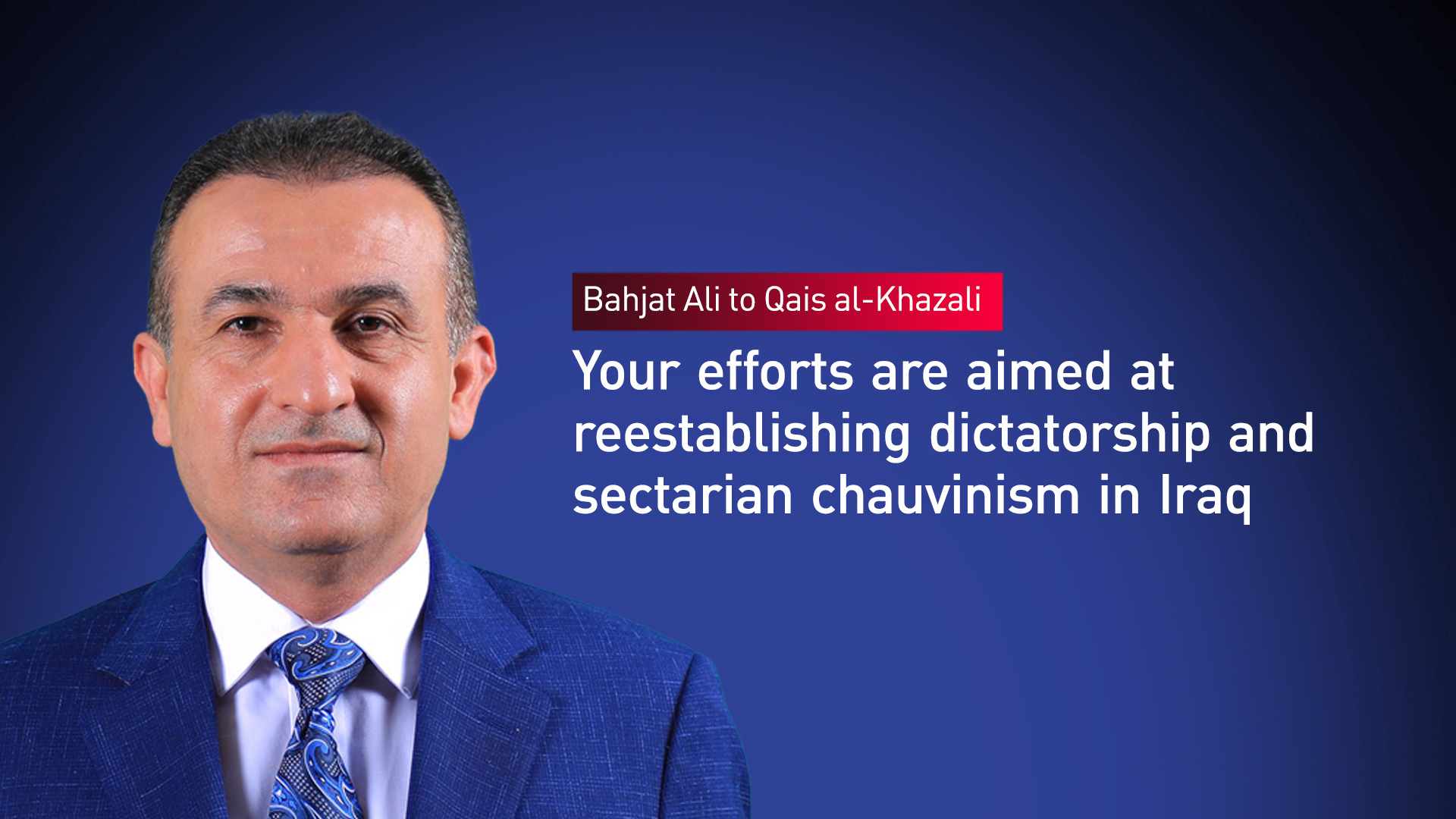Kurdistan MP Rebukes Asaib Leader: “You Have No Right to Speak About Kurdistan’s Fate”
Kurdish MP Bahjat Ali fiercely rebuked Asaib Ahl al-Haq leader Qais al-Khazali for using his Eid sermon to attack Kurdistan. Ali accused Khazali of rejecting federalism and warned him that stronger men have failed to subdue Kurdistan—and so will he.

By Kamaran Aziz
ERBIL (Kurdistan24) – Bahjat Ali, a member of the Kurdistan Region Parliament, has issued a strong and detailed response to Qais al-Khazali, Secretary General of Asaib Ahl al-Haq, and a U.S.-designated terrorist and human rights abuser, following al-Khazali’s Eid al-Adha sermon in which he criticized the Kurdistan Region and questioned its commitment to Iraq's unity.
In his remark, Ali asserted that even during a sacred occasion like the Eid prayer, al-Khazali could not restrain his animosity towards the Kurdistan Region. “Not even during the Eid sermon could you suppress your hatred and hostility towards Kurdistan,” he said, noting that al-Khazali once again used his platform to express divisive and inflammatory rhetoric.
The Kurdish MP underscored that al-Khazali and similar figures lack belief in federalism and the Iraqi constitution. “You and those like you do not believe in federalism or the Constitution,” Ali said. “All of your efforts are aimed at reestablishing dictatorship and sectarian chauvinism in Iraq.”
Ali, directly addressing al-Khazali, stated: “I am an elected representative of Kurdistan, and I say this with absolute clarity – you, from your current position, neither possess the right nor the legitimacy to speak about the people of Kurdistan, let alone about the fate of Iraq.”
Ali further highlighted that al-Khazali, even in his Eid message, failed to conceal his contempt for the Kurdistan Region. “Despite the sanctity of the day, you continued to speak with hatred and hostility, perpetuating dangerous narratives instead of preaching unity.”
Responding to al-Khazali’s claim that “the Kurds do not believe in Iraqi unity,” Ali reminded him of post-2003 political history. “Since 2003, it was on the shoulders of Kurds that you rose to power. The Kurdish people made every effort to build a shared life, a democratic and federal Iraq, where the rights of all citizens are respected.”
He continued, “But it was you who never believed in federalism, the constitution, or democracy. Every move you’ve made has been to restore tyranny and impose sectarian supremacy across Iraq.”
Ali pointed out that those who genuinely care about Iraq’s future would not be promoting exclusion and hatred. “Those who claim to care about Iraq’s unity must first demonstrate their commitment to equality and constitutional order. Instead, al-Khazali and his allies have subordinated Iraq’s future to sectarian, regional, and foreign agendas.”
The Kurdish MP emphasized that al-Khazali and similar figures have no legitimate authority to comment on the fate of Iraq. “You are not qualified to talk about Iraq’s future or its system of governance,” he said, adding that “Everyone knows your record of corruption, smuggling, and the disasters you’ve brought upon southern and central Iraq.”
Ali also called for greater public awareness, urging Iraqis to scrutinize the facts and draw comparisons. “For the sake of truth and transparency, we call on all the Iraqi people to undertake an independent assessment, compare your actions and Kurdistan's achievements, and judge who has respected the public’s rights, who has looted Iraq’s resources, and who has deprived citizens of a dignified life.”
He went on to state that al-Khazali and his ilk, who constantly antagonize the Kurdish people and seek to distort Arab public opinion, do not represent the Iraqi populace. “You are not elected by the people, you are not their voice.”
Ali also underlined that al-Khazali and his affiliates only attained power due to a unique and manipulated electoral context. “You came to power not through fair representation but as political replacements due to backroom deals and the absence of real alternatives,” he said. “Now, you arrogantly seized control of Iraq’s wealth and the fate of its people, deluding yourselves that you can extend this dominance over Kurdistan as well.”
In closing, Bahjat Ali delivered a final warning: “Al-Khazali should remember, far stronger and more authoritarian figures than you have tried and failed to break Kurdistan. The world has witnessed what became of them, and your fate will be no different.”
